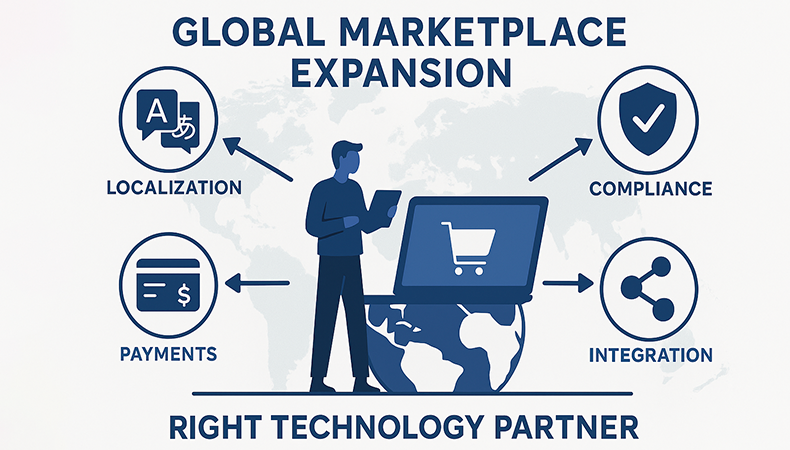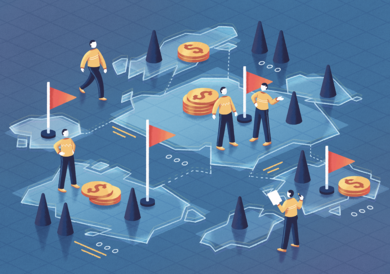
Expanding a digital marketplace beyond borders isn’t just about translating your website or adding multi-currency. It’s about creating a technological foundation that connects your marketplace with global shipping carriers, 3PLs, and retail sales channels - ensuring orders, inventory, and tracking flow seamlessly across borders.
Choosing the right technology partner can determine whether your marketplace thrives internationally or stalls under complexity. The partner you select should not only build but co-create your expansion strategy - anticipating market demands, compliance nuances, and the evolving expectations of global sellers and buyers.
This article explores the core challenges of global scaling, why one-off vendors fail, and what separates world-class tech partners from short-term contractors. It also shares success stories and practical guidance for founders, CTOs, and marketplace leaders preparing for international growth.
The challenges of going global with a marketplace
Expanding an online marketplace globally sounds exciting, but it’s also one of the most complex transformations a digital business can undergo. Each market brings new variables - languages, payment systems, tax laws, shipping logistics, cultural norms, and data regulations.
Let’s look at the most common barriers:
| Challenge | Description | Why it matters |
| Multi-channel order and shipping sync | Coordinating data between marketplaces, couriers, 3PLs, and warehouses requires real-time API communication. | Delays or mismatched data lead to missed deliveries and customer dissatisfaction. |
| Localisation complexity | Translating content is just one part - local shipping rules, packaging standards, and delivery expectations also vary. | Poor adaptation causes higher return rates and lost conversions. |
| Multi-channel order and shipping sync | Coordinating data between marketplaces, couriers, 3PLs, and warehouses requires real-time API communication. | Delays or mismatched data lead to missed deliveries and customer dissatisfaction. |
| Regulatory & tax compliance | Each region has distinct VAT, sales tax, and import/export rules. | Missing compliance can block operations or result in fines. |
| Integration overload | Global scaling often requires dozens of new APIs - payment gateways, logistics systems, and ERP tools. | Poorly managed integrations cause downtime and data loss. |
| Infrastructure scalability | Traffic spikes from new regions can overload servers and APIs. | Performance issues quickly erode customer trust. |
| Customer support & seller enablement | Multilingual support and onboarding systems are essential for retention. | A single support bottleneck can ruin reputation. |
The complexity multiplies when marketplaces manage multi-vendor ecosystems. Sellers expect instant onboarding, transparent payouts, and reliable integrations with their own systems.
Without a strong technology backbone, even the most promising expansion can crumble under operational chaos.
Let’s talk about your expansion goals
Contact UsWhy one-off vendors fail (and strategic partners win)
A common mistake companies make is treating global expansion as a series of isolated projects - one vendor for payments, another for logistics, a freelancer for UX localisation. This vendor patchwork creates silos and incompatibilities that become costly to fix later.
For marketplaces, logistics is often the breaking point. Working with separate vendors for shipping APIs, inventory sync, and retail channel connections creates fragile systems that collapse under scale. A single, strategic integration partner keeps every connection (from courier tracking to product feeds) unified and monitored.
In contrast, strategic technology partners think long-term. They architect systems with interoperability, performance, and global scalability in mind. Instead of merely completing tickets, they anticipate growth patterns and adjust solutions proactively.
Choosing the right partner means finding a team that scales with you, not just invoices you.
3 criteria for choosing the right tech partner
Building a global SaaS or marketplace platform isn’t the same as building a store - it requires orchestrating logistics, inventory, and fulfillment across continents.
Below are the 3 key criteria every founder or CTO should prioritise.
1️⃣ Domain expertise in marketplaces
Building a global SaaS or marketplace platform isn’t the same as building a generic e-commerce store. It involves complex multi-sided interactions between buyers, sellers, and service providers - each with unique technical and compliance demands.
Your partner should understand:
● Multi-vendor architecture (account hierarchies, seller dashboards, commissions)
● Payment orchestration (multi-currency, split payments, escrow)
● Regulatory constraints (KYC, AML, and data localisation)
● Real-time logistics and inventory synchronisation
● Deep knowledge of courier, warehouse, and 3PL integrations (DHL, DPD, Royal Mail, Amazon FBA, Shopify, and others)
Look for partners who’ve already scaled marketplaces or SaaS ecosystems internationally. Review their portfolio for evidence of integrating regional APIs, managing multi-lingual CMS systems, and optimising global user experiences.
| Evaluation question | Why it’s important |
| Has the partner built or scaled a marketplace before? | Experience reduces risk and accelerates delivery. |
| Do they understand platform monetisation models? | Ensures alignment with your business strategy. |
| Can they integrate region-specific payment and tax systems? | Avoids costly compliance errors. |
2️⃣ Ability to scale integrations globally
Global expansion often means managing dozens of new integrations - each with different data formats, latency, and reliability.
A strong technology partner will:
→ Establish a logistics backbone that connects your storefronts, ERPs, and fulfillment centers through automated shipping, dispatch, and tracking updates
→ Implement integration middleware or iPaaS (Integration Platform as a Service) to centralise APIs.
→ Build a modular architecture that can easily add or replace integrations.
→ Offer 24/7 monitoring and automated error recovery for mission-critical processes.
→ Support multi-region cloud deployment for latency optimisation and compliance.
| Integration layer | Example tools/technologies | Business benefit |
| Shipping & 3PL APIs | DHL, FedEx, DPD, Royal Mail, ShipStation, Amazon FBA | Automated label generation, dispatch tracking, and status sync |
| Sales channels | Shopify, WooCommerce, eBay, Zalando, local marketplaces | Centralized order management and multi-channel fulfillment |
The right partner doesn’t just “connect APIs” - they create a resilient integration fabric that supports long-term growth.
3️⃣ Cultural & compliance adaptability
Global scaling is not only a technical challenge - it’s also cultural and legal. What works in the U.S. might be unacceptable in Japan or Germany. A capable partner must blend technical precision with local awareness.
While localisation and compliance are crucial, the real challenge lies in aligning these with logistics workflows - ensuring that each region’s fulfillment and data regulations are integrated, not isolated.
| Region | Key compliance focus | Example |
| EU | GDPR, VAT OSS | Data storage within EU data centers |
| USA | CCPA, ADA | Accessible front-end interfaces |
| APAC | PDPA, ICP | Local cloud hosting and registration |
| LATAM | Tax & FX Control | Integration with national payment rails |
Partners that maintain local liaisons or compliance advisors can save months of legal delays and build faster trust with regional partners.
Let’s talk about your expansion goals
Contact UsCase studies: global expansion success stories
Let’s explore real-world examples where choosing the right technology partner made the difference between stagnation and scalable growth.
SaaS marketplace expanding from Europe to North America by integrating with local shipping carriers and tax systems
A mid-sized SaaS marketplace based in Berlin wanted to expand into the U.S. and Canada. Their local infrastructure couldn’t support regional tax systems, multi-currency payments, or integration with North American logistics providers.
After selecting a strategic integration partner, they:
— Migrated to a multi-region AWS architecture for faster performance.
— Integrated Stripe Connect and Avalara for automated payments and tax compliance.
— Localised onboarding flows and email templates for U.S. English and French (Canada).
— Improved checkout conversion by 22% within six months.
The partner’s end-to-end enablement (from API integration to compliance automation) reduced expansion costs by 35%.
E-commerce marketplace entering APAC and connected directly with regional 3PLs for faster last-mile delivery
An e-commerce marketplace from the UK wanted to tap into the booming APAC region but struggled with language, currency, and local tax barriers.
By partnering with a tech team specialising in multi-lingual and multi-currency ecosystems, they:
— Deployed region-specific hosting compliant with PDPA and ICP regulations.
— Implemented AI-driven translation and content localisation.
— Integrated Payoneer for seamless seller payouts.
— Created modular integrations with local couriers like SF Express and Yamato.
Result: the platform achieved market entry into 5 countries within 8 months and saw a 40% increase in seller registrations.
B2B marketplace expanding to the Middle East and established integrations with local freight and warehouse providers
A European B2B marketplace in the construction industry needed to expand into the Middle East. Cultural and regulatory complexities (such as Halal certifications and Arabic localisation) were major obstacles.
Their technology partner developed:
— Bidirectional Arabic interface and RTL (right-to-left) UX.
— Integration with local payment systems supporting regional banks.
— Compliance modules aligned with GCC data laws.
— Automated supplier verification with AI-assisted KYC.
This allowed the marketplace to secure partnerships with three government procurement agencies in the region within the first year.
How Patternica can help you scale globally
At Patternica, we specialise in connecting global marketplaces with shipping carriers, fulfillment centers, and local retail channels. Our integrations ensure every order flows automatically (from purchase to packaging, dispatch, and delivery) while keeping your data unified across systems.
Whether it’s synchronising stock between Shopify and DHL, automating dispatches through 3PLs, or consolidating orders from Zalando, eBay, and Amazon, Patternica makes your global logistics run like one connected system.
Our approach is simple: build technology that grows with your business, not against it.
We combine deep marketplace expertise with hands-on integration across:
Global payment and tax systems (Stripe, Adyen, Avalara, Payoneer)
Multi-region logistics APIs (DHL, UPS, local carriers)
Cloud-based scalability through AWS and GCP multi-zone deployments
Localisation and compliance for GDPR, PDPA, CCPA, and region-specific data laws
AI-powered monitoring and analytics for real-time decision-making
Our teams work closely with founders, CTOs, and product leaders to align every technical decision with business outcomes.
The result? Faster launches, fewer bottlenecks, and sustainable global operations built on solid code and experience - not guesswork.
Let’s talk about your expansion goals
Contact UsConclusion
Global expansion isn’t a sprint - it’s a marathon that tests every layer of your marketplace architecture. From integrations with 3PLs and shipping carriers to localisation and compliance, the foundation you build determines how far your business can go.
The right technology partner acts as a growth multiplier - not only delivering solutions but continuously evolving them as your business enters new markets.
Rather than chasing short-term deliverables, these partners become an extension of your vision - turning complexity into opportunity, and expansion into sustainable success.
FAQ
How do I choose the right tech partner for global expansion?
Look for partners with proven marketplace experience, global integration capabilities, and a proactive approach to compliance. Ask for case studies in your target regions and evaluate their communication style, scalability roadmap, and cultural adaptability.
What’s the difference between a vendor and a strategic partner?
A vendor executes predefined tasks; a strategic partner aligns with your long-term goals. While vendors deliver projects, partners deliver outcomes - continuously optimising systems for scalability, performance, and ROI.
What are the biggest risks in global marketplace scaling?
The main risks include integration failures, non-compliance with local regulations, and cultural misalignment. Without the right partner, these risks can translate into delayed launches, financial penalties, or brand damage.


.png)